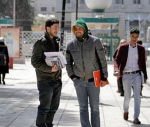You are here
War comes to the home front
Sep 27,2016 - Last updated at Sep 27,2016
Sunday’s gunning down of Nahed Hattar, a controversial leftist political activist and journalist, in front of a courthouse in Amman has shocked Jordanians.
It was the first assassination of someone on the basis of his political beliefs and daring opinions in the modern history of Jordan.
He was killed by a salafist who admitted he was outraged by Hattar’s reposting on his Facebook page, in August, of a cartoon that mocked Daesh’s perception of paradise, although the killer said he had no sympathy for the terrorist group.
The cartoon offended many and the government was prompted to take action. It arrested Hattar and later released him after he was charged of stirring sectarian tensions. He was to stand trial when he was assassinated.
His death has triggered reactions from all sections of Jordanian society.
Political and civic parties and organisations condemned the cold-blooded murder and so did the government.
But the incident also exposed the depth and complexity of social fractures and elicited responses, on social media outlets, that ranged from lauding the killer and identifying with his motives to inciting hatred and violence against those who disagree with them.
Hattar himself was a target of such campaign and his relatives complained that the government did nothing to protect him after he received tens of death threats.
But this is not about Hattar, a Jordanian Christian who for decades opposed government economic and political policies, was a stark critic of political Islam and, more recently, a staunch supporter of the regime of Syrian President Bashar Assad.
This is about freedom of expression, individual rights, state of law and civil society versus takfiri ideology, among others.
Hattar’s killing is an indication of the undercurrents that are shaping Jordanian society and will determine its future evolution.
It puts decision makers, thinkers, academics, political parties, civic institutions before a crucial test: should they bow to dark forces that do not recognise the state, its goals and objectives, or will they submit and allow chaos and discord to take over?
Like many countries in the region and the world Jordan has a problem with extremists.
The salafist jihadist movement is alive and kicking, and there are thousands of young Jordanians who have joined the ranks of Al Nusra Front and Daesh in Syria.
In fact, in terms of numbers, Jordan has the highest number of jihadists per capita fighting in Syria today than any other country.
In many areas of the Kingdom, there are social incubators of extremist ideologies. And in a largely conservative society, the lines separating Daesh ideology from the principled beliefs that many Jordanians espouse are often blurred.
This puts pressure on the state, which is committed to fighting the khawarej, or outlaws, in the battlefields of Syria, but often lacks a long-term vision and strategy about the battle on the home front.
Social media have empowered Jordanians from all walks of life, but judging from reactions to Hattar’s killing a Daesh-like mentality is metastasising, even among the educated.
This says a lot: It underlines the fact that the state lacks the political will, and perhaps the instruments, to confront this menace.
If the state is willing to declare war on takfiris and outlaws who do not recognise its legitimacy in Syria and elsewhere, why is it hesitant to do the same at home?
What is scary about Hattar’s murder is that it was apparently carried out by a lone wolf and not an organised group. The latter would have been easier to locate and destroy. But in the case of the killer, he is a man who harbours beliefs that are shared by many in our society.
Again, social media, for lack of other evidence, are crucial indicators.
This brings me back to other pertinent issues: state of law, freedom of expression, pluralism, individual rights, civil state and the concept of citizenship.
Jordan has succeeded in preserving its civil institutions at a time when similar ones were collapsing and disintegrating in many countries of the region.
It has a liberal constitution that protects individual freedoms and enshrines the state of law. But these are not normal times.
Takfiri ideology has found fertile ground and experts must debate the reasons for this phenomenon.
Sectarian wars are flaring up and ethnic in-fighting is dismantling entire nations.
We are seeing worrying signs of social tensions, communal violence, the birth of auxiliary identities, tribalism, spread of guns and a waning in law and order in our society. The state has done little to confront such threats to national unity.
Hattar’s murder should be seen as a wake-up call for all.
At the end of the day, we have to realise that fighting extremism, in all its shapes and forms, is now a domestic issue.
And like all wars, sacrifices have to be made for society to survive.
It is a war that should be fought in schools, universities, refugee camps, dysfunctional neighbourhoods and even in mosques that are used by those who spread hate and sedition.
It is a war, a battle for minds and hearts that we must eventually win.
The writer is a journalist and political commentator based in Amman.













